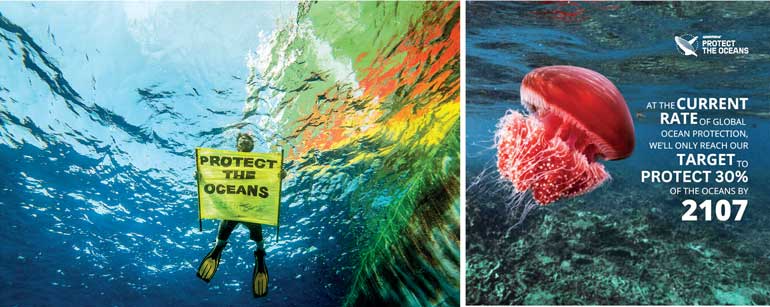Thursday Feb 19, 2026
Thursday Feb 19, 2026
Wednesday, 30 October 2024 00:20 - - {{hitsCtrl.values.hits}}

 As I reflect on Sri Lanka’s recent Government change, I see not just a political shift but a pivotal moment for our nation — a chance to redefine our economic and environmental future.
As I reflect on Sri Lanka’s recent Government change, I see not just a political shift but a pivotal moment for our nation — a chance to redefine our economic and environmental future.
The question remains: will we seize the opportunity to become a leader in marine conservation, or will we let this moment slip away?
Sri Lanka stands at the crossroads of unique opportunities that can redefine its trajectory. This moment calls for bold reforms and visionary leadership, especially in aligning our nation with global sustainability standards. For business leaders, Government officials, and practitioners across various sectors, one of the most significant ways to contribute to this progress lies in adopting the High Seas Treaty — a global agreement designed to protect marine biodiversity and ensure sustainable use of international waters.
As an island nation, Sri Lanka’s economy is intricately tied to the health of its oceans. Our fishing industry and tourism sector, vital to our economic resilience, depend on thriving marine ecosystems. By ratifying the High Seas Treaty, Sri Lanka can not only demonstrate its commitment to sustainability but also unlock new economic opportunities that come with a healthy ocean. This treaty is a low-hanging fruit, a straightforward step that signals our readiness for global citizenship and aligns us with international environmental standards.
Greenpeace South Asia’s role as a campaigning organisation becomes vital in this context. Not focusing solely on aid and relief, we rather advocate for systemic changes — pushing for policy shifts, influencing corporate behaviour, and mobilising public support to address the root causes of environmental challenges. Our recent successes in India, where we campaigned for crucial policy changes on issues such as Extreme Weather Events (EWE), Urban Mobility and air pollution, underscore the potential impact of our work.
Why the High Seas Treaty matters for Sri Lanka’s economy
Sustainable practices are no longer a luxury — they are essential for ensuring long term livelihoods, healthy ecosystems and business growth. Sri Lanka’s fisheries and coastal tourism heavily rely on the health of our surrounding waters. Overfishing, pollution, and climate change pose significant threats to these industries. Ratifying the High Seas Treaty would represent a significant step toward securing the future of these sectors, ensuring that ocean resources in international waters are managed sustainably — not only to protect migratory species and improve the oceans’ resilience to buffer climate change with marine protected areas on the high seas — also to pave the way towards more sustainable and beneficial management of our coastal resources.
Furthermore, sustainable practices attract investment. Global investors increasingly scrutinise a country’s Environmental, Social, and Governance (ESG) credentials when making decisions. By adopting international agreements like the High Seas Treaty, Sri Lanka can improve its ESG profile, making the country more appealing for foreign direct investment. Companies that prioritise sustainability are more likely to secure international partnerships and access markets that demand responsible business practices.
A path to global leadership
For the current Government, ratifying the High Seas Treaty offers a strategic opportunity to position Sri Lanka as a responsible global actor. Aligning with international environmental standards not only protects our natural resources but also enhances our global image, paving the way for new diplomatic relationships and economic partnerships. Additionally, the treaty could unlock international funding for sustainable development projects, underscoring the importance of environmental advocacy within the development sector. By embracing such treaties, the Government can demonstrate a commitment to both economic progress and environmental preservation.
The role of Greenpeace in Sri Lanka’s new journey
As we extend our efforts to Sri Lanka, we are eager to collaborate with the Government to bring similar progress as we have achieved in the region. Our focus is on systemic changes, addressing the root causes of environmental degradation. By working together with stakeholders across sectors, we can help Sri Lanka leverage global environmental treaties to secure economic benefits and protect our natural resources.
Seizing the opportunity for a sustainable future
Sri Lanka’s new Government has the opportunity to embark on a path of sustainable growth — one that values our natural resources and aligns with global environmental standards. Organisations like Greenpeace are here to support this vision, providing the expertise and advocacy needed to drive systemic changes that benefit both our economy and the environment.
By ratifying the High Seas Treaty, Sri Lanka can position itself as a leader in marine conservation, safeguard its industries, and strengthen its economy within a sustainable framework. As we step into this new era, we at Greenpeace are ready to collaborate with the Government, scientific stakeholders and civil society to build a future where sustainable development is at the forefront of national progress.
(The writer is the Deputy Program Director for Engagement at Greenpeace South Asia)